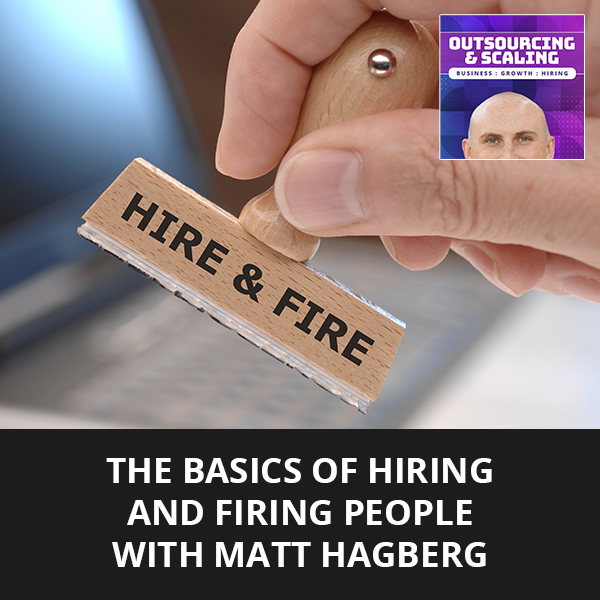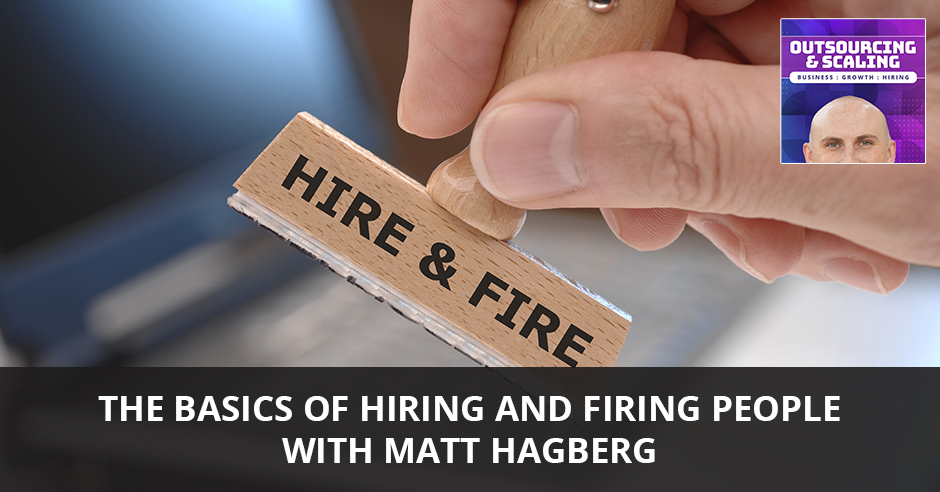


When trying to create and scale a business that you can recreate over and over again in different locations, it is absolutely necessary to build a team of people who can do their day to day stuff and find someone who can replace you when you step away to start another location. Business operation consultant Matt Hagberg talks about the basic of hiring and firing people before expanding, and explains the real cost of not putting the right person in place. Matt has been in the pest control business before growing an eCommerce business from zero to six figures and eventually becoming a business operation consultant.
—
Listen to the podcast here:
[smart_track_player url=”https://www.podetize.com/statsapi/www.podetize.com/wp-content/uploads/fileuploads/11-5b145ef137b51b3d1af0633e9305c43d/09/2019/a322ae833d2d472aa8914aa2b7eb49d0.mp3″ title=”The Basics Of Hiring And Firing People with Matt Hagberg” artist=”Nathan Hirsch” image=”https://freeup.net/wp-content/uploads/2019/04/OAS.png” ]
Download the audio file here.
The Basics Of Hiring And Firing People with Matt Hagberg
My guest on this episode is Matt Hagberg. Matt, how are you doing?
I’m great. How are you?
I am great too and I’m excited to talk to you. I know you’re a system and process guy, all inside business operations. For those of you who don’t know, Matt is a college dropout who jumped around different industries before finding a home in the pest control business. He created a business that was spreading to over one to three locations every year before eventually exiting out of the business, selling it. He then got into eCommerce growing an eCommerce business from zero to six figures in three months before finding ClickFunnels. As a business operation consultant, we’re going to talk all about that. I want to hear your story. What were you like growing up before the pest control business? Were you a straight-A student? Were you a rebel? Did you know you want to be an entrepreneur? It seems like you’ve been doing that since a young age.
I went back and forth. I was a straight-A student for a very long time. When I got into my teenage years, obviously I wanted to rebel a little bit, so things got a little rocky around that timeframe. I was a straight-A student. Everybody told me, “Keep getting good grades, jump into college and you can do whatever you want.” People kept telling me, “You should be a lawyer because you can. You can do it. It pays a lot of money.” It was a big driver for me. When I was a kid, I would go around the neighborhood trying to mow lawns. I was always trying to be out there doing something entrepreneurial, making money in my way, but it never really dawned on me. I didn’t have anyone in my life to show me that I could make a life out of being a business owner. I kept on that path of just getting good grades and eventually going to college and trying to become a lawyer. It was in college when I realized I didn’t want to do that. Rather than spending $10,000 to $15,000 a semester to go to school and party, I decided to bail out and started working different jobs in different industries to figure out what it is I wanted to do. Even at that time, I was doing small entrepreneurial things, but I didn’t have anyone to tell me, “You can turn that into a lifestyle.”
With that pest control business, what goes into expanding different locations? You have to be doing something right. You have to have your processes down. You can’t be at all these locations every day managing everything. Talk to me about that, because I feel like a lot of entrepreneurs don’t create a business that they can replicate over and over and have the same thing happen in different places.
The first step was figuring out in our one location, what is it that we wanted to accomplish and step back and figure out the steps that it takes in the day-to-day operations and who we need in order to fill those in? That was what we did. In the first year, it was me building a team of people that can do the day to day stuff and I would oversee them, but then the next step was I need someone to replace me so I started looking for people. The good thing is we’ve always been blessed with finding good people and bringing them on. One of my first managers was a guy that I’m still friends with now. He runs his own pest control company in the same area. It was really about figuring out what needs to get done consistently and then hunting for those people and putting them to the test to figure out if they can do those things day in and day out.
[bctt tweet=”Firing people isn’t being mean. If you need to fire them, it’s probably because neither of you enjoy being there.” username=””]
Putting them in place before, then stepping away and going and starting in another location. We had made the mistake of not finding the right people before expanding. I then had to go back and clean that up and figure out how to do that the right way. That was a whole other issue that came in, but really that’s what it is. Stepping back and figuring out what it is that your team needs to be doing while you’re gone and finding the people to do those things.
How much checking in are you doing with each location? We’ll move forward. We’ll talk about eCommerce, but how much are you calling them every day? Are you getting weekly reports? How does that work?
It depended on the people that I found, but every day we talked. When we talked every day, it wasn’t like, “Tell me everything you did in the last eight to twelve hours.” It was, “Here’s the key performance indicators, the KPIs that we need to pay attention to because those are the things that are a pulse of what’s going on.” Those would be anything from a number of sales we created, lost customers that we’ve had. It’s a cultural thing as well. It’s like, “How many people are we hiring? How many have we fired? How many walked away? What kind of complaints do we have that are coming in?” and those types of things. It was performance and operations, but also the people, how are people feeling? How do they respond to us? Are they happy? Do you do things that are fun? We had to figure out how to balance culture and operations at the same time.
Are those the same KPIs you have your clients do even or does it change depending on what industry they’re in?
It changes on depending on the industry, but not as much as you would think in my experience. Every industry obviously has, for example, if I’m working with a supplement company. Their KPIs are a little different based on sales. They might need a smaller staff and those types of things. There’s still a culture and there’s still an operation so no matter what, they’re still those factors that play a role.

You joined eCommerce. You had some success early on. What is it like structuring an eCommerce business?
It was very similar. As I put this, it was my first time doing it. As I was building it and putting it together, I was doing it all on my own. I stepped back and I looked at all the different pieces of what it takes to run the business on a daily, weekly and monthly basis? I listed all of them out. This is one of the things I teach my clients. I listed all of them out and I put them into these four quadrants. The four quadrants are, in the bottom right, I have things I hate doing and I’m bad at. In the bottom left quadrant, I have things I’m good at, but I hate doing. In the top right quadrant, I have things I like doing but I’m bad at. In the top left quadrant, I have things I’m good at and I love doing.
That bottom right quadrant of things I hate and I’m bad at, that was the first thing I got rid of. This was before I knew you and I didn’t know FreeUp was an option. I jumped into Upwork and a couple of other places and they started looking for people. My biggest thing was order fulfillment. It was a very mindless task that I could give to somebody because it was just copy and paste in a drop shipping situation. That was the first thing I gave away. We were doing 125-ish orders a day. It was a lot of work that I was able to take off my plate and hand over. Then piece by piece, I followed that quadrant and figured out what to give away of what times. That way, I can focus on building a business.
How do you get out of that mentality that hiring creates more work for you? I feel like a lot of people that go into it are like, “I hate doing these things. I’m going to hire someone.” At some point, they’re like, “This is taking too much time. I’m going to do it myself or their systems aren’t strong.” What do you teach your clients to get over that?
In a lot of cases, what I do is I take a step back and I show the client what it would cost for them to not put that person in place. I’d tell them like, “How much money are you wanting to make per hour?” Usually, their answer is somewhere between like the $50 and $500 range or whatever the case may be, depending on the industry and the client. I asked them, “How much is this particular task making you per hour?” They say, “Probably $10 to $25 an hour.” I said, “How much would it cost for you to actually give it to somebody?” With FreeeUp, it could be anywhere from $5 to $25 an hour.”
I say, “What you’re telling me is you’re making less than you want to make per hour. If you hired this person to do it for you, you could actually make more per hour and do less work of it. Is it worth the loss of money to not train someone to do this? When you train them the right way, then you never have to train them again. You do it once and you never train them. In a lot of cases with like Loom and Zoom and all of these, we’re in an age where technology is on our side, the business owners. You can literally make standard operating procedure videos and put them in Google Drive or Dropbox or whatever. Anytime you hire someone new and all they’re doing is a simple task, you send them to that video and anytime they have a question, they can reference the video on how to do something.”
[bctt tweet=”When you’re starting a business, you make mistakes. Learn from them and move on. ” username=””]
We were talking before that, that you have this process that you put your clients through and I feel like we started to go into it. Why don’t you walk us through that process of a client comes to you, they’re trying to scale their business, they’re trying to figure out, “Do I need internal freelancers? Do I need a VA? Do I need high-level freelancers?” Can you walk us through that?
The first thing that we do is what I did with my eCommerce business and what I’ve done with pest control and other businesses as well. The first thing I do is we write out everything that it is, that gets done in a day and a week and a month. If you’re the entrepreneur and you’re by yourself, then what we do is we do that four-quadrant concept, that exercise. We’ll figure out first what it is in that you’re bad at it and you hate doing in the quadrant. We set that aside and say, “These are the first things to knock out.” We’ll take a step back and we started talking about what it would look like if you have a VA versus people on site.
I’ve done both and really depends on the industry. For example, in pest control, you can’t really have VA’s because you need technicians to serve as Holmes. You need your customer service staff can be remote, but you have to have onsite staff as well. It depends on what you’re trying to fill. However, on the eCommerce side, a lot of that can be remote because if you’re doing order fulfillment, customer service, whatever the case may be, unless you’re doing order fulfillment on your own in a warehouse, you don’t need onsite people.
We walked through that concept of what do you want your operation to look like and what are you comfortable with? As I’ve grown, I’ve realized I enjoy having people on my team on-site because there’s this culture that it creates and cultivates that I enjoy being a part of. There are key things that if I can’t find them locally, especially we talk about FreeUp having access to people who have more sophisticated skills. Whether it’s design or whatever the case may be, those people aren’t as readily available locally. Being able to hire someone remotely can be better accessed.
We walked through that whole process and then we start interviewing. The biggest key to interviewing is people don’t trust their gut enough. People will sit down or they’ll be on the phone. I always recommend doing a Zoom interview, something face to face, even if it’s digitally facing to face because it gives you an ability to read the person and see if your gut is telling you that this would be a good addition to your team. People discount their gut way too much and they consider the resume way too much. I figured out a balance of both through all of my businesses and I help my clients to do the same thing so that way they can build a business they have fun running, rather than feeling they had to babysit people to do a job instead.

How does this process change? Let’s say if it’s a newer business that’s having success for the first time that needs to hire their first person. Someone who might have a bunch of people already working with them, but it’s not organized enough and you need to go in and restructuring. How does that process change?
I feel sorry for the people who are already further along, that realize they need to change something because then it gets painful. I’ve run into this situation with a few different clients and the basics are still the same. The stuff to figure out like what needs to get done and who needs to do it, but when you’ve had people, the first step you have to do before you start interviewing people is you have to back up and say, “Are the people that I have right now actually accomplishing what it is that we need to get done? If I were to interview them again, would my gut tell me no and that this person’s not a good fit?”
There are times where you then have to back up and assess your current situation and you don’t have the right people in place. You got to go through the hard task of getting rid of those people. When I talk to clients, I try to tell them firing people isn’t being mean. If you’re wanting to fire them, it’s probably because neither of you enjoys being there. You’re really releasing both of you from hating your life for eight to twelve hours a day so do it. Rip the Band-Aid off and tomorrow you’ll breathe a lot easier. That’s the big difference. You’ve got to make some hard decisions on your personnel right off the bat.
Any other firing tips because I feel like we don’t talk enough about firing out this podcast? It’s obviously that subject that no one wants to hear. Any other tips for someone who might be scared out of their mind or they’re afraid that someone’s going to blow up or hurt their business or are any of the common fears that entrepreneurs have?
It’s a mental shift for the business owner as far as what firing is. It’s not like you’re going in and being mean and hopefully, you’re not a mean person as a business owner. What we did was anytime someone came into our business, one of the things we told them when you come in, we want you to learn as much as you can possibly learn. Not just because we want you to be good here, but because we want to set you up for success in your own life in general. When you show people that you care about them beyond showing up and doing work for you, then they see that you have a vested interest in them becoming more than who they were.
When I train managers or business owners to hire people, I always tell them, “While you’re interviewing and while you’re training people, always keep this in mind, your goal and your job is to help that person be better tomorrow than they are today. If you can do that, they’ll do more in your business tomorrow, which means your business is going to succeed and they will love you for doing that and they’re never going to hurt your business if they know that you love them.” That’s the first step in it. The second step is making sure you’re setting them up for success. Sometimes when you think you need to fire someone, you need to back up and say, “Did I train them properly in order to do their job? Did I give them the tools they needed?” If the answer’s no, you should be firing yourself. You need to put in the effort to actually train those people.
[bctt tweet=”Just keep caring for the people that are coming into your world and you’ll usually make the right decision.” username=””]
If both of those things are there and they’re still not succeeding, then you need to have a conversation with them and be honest about it. There are too many people that dance around the conversation and then no one knows where the other person stands. It needs to be an open conversation and a caring one that is, “This is what the expectation is of what your role is. This is what we need from you. What do you need from us in order to help you accomplish that?” When you’re on the same page moving forward, then at that point, if they still aren’t performing the way you need, then you have the right to say, “This isn’t a good fit.”
You’ve proven that you care for them over and over again. I’ve actually had people and I love to tell the story. I had a manager and she had some life changes that happened in her life and for a couple of months I could tell she was just miserable. We sat down and we had a conversation about it and come to find out before she had gotten a job, the reason she got the job with me is because she had this type of kid and she needed to find a job so she could have income. The child’s father was no longer in the picture, so she was on her own trying to make money but before that she was trying to go to school to be as a special education teacher.
We worked through some things. It got a little better for a couple of months, but it reverted right back to her being miserable. Finally, I sat her down and it’s like, “I’m going to let you go, but it’s not necessarily because you don’t do a good job. It’s because you’re miserable here and you need to go back to school and you need to do what you want to do.” At that point, she was in a point where she could, so she did. She went back to school. She hated me at the moment. She was miserable. She didn’t like the fact that she was getting fired but a couple of months later she called me up and she invited me and my wife to her wedding because she realized that getting fired was the best thing she could have done. She went back to school, she got her degree and she just started working as a Special Education teacher and she loved it. She was completely happy. If it wasn’t for the fact that I spent time trying to care for this person, I never would’ve known that. If you can spend time caring for people, you don’t need to worry about firing them. You need to worry about, “Is you being here good for both of us? If it’s not, then maybe you need to go somewhere else.”
I think that’s a fantastic point because I think one of the questions I always had asked is about the risk of hiring. You’re right, if you come from a place where you care about the people and it’s about building relationships, that percentage doesn’t go to zero but it goes way down. Talk to me about the whole investment thing because I think that’s where a lot of people struggle as well. Let’s say you make a bad hire and you catch it out on week one. You haven’t made that much of an investment, pretty easy to part ways. As you get further and further along, you’ve invested money, you’ve invested time and other resources into them. How do you figure out whether you should keep trying to go into someone and turn them around or get them back to where they were before versus just cutting them off and starting off with someone new?
There are a couple of different things that you’ll hear out there in the world like for example, don’t throw good money after bad. That would be a situation where you saw a contractor do something that would make you potentially fire them. Do you throw more time and money and say keeping them around and training them? You also have those stories of some contractors made a mistake and it cost the company $3 million. Do you fire them or do you look at it as a $3 million investment into their training? That’s always which one do you choose? The way that I usually look at it is, “Did they learn from the previous mistakes?
If they’re constantly learning and changing and growing and they’re not making the same mistakes over and over again and they’re not cancer to your culture, then they’re a good investment. When you think about it, when you think about your own investment into yourself and to building your own business, you make mistakes. When you’re a solo entrepreneur, when you’re starting your business, you made mistakes. The question is, “Did you learn from them and move on?” If you didn’t, you are not a good investment in your own business, but if you did, you’re a good investment in your business. Use that same philosophy for your contractors if they’re learning, if they’re growing and not making the same mistakes. I’m going to repeat. If they’re not cancer to your culture, we’ve had plenty of people that did their job just fine, but they were cancer to the culture and that’s why we got rid of them because they’ll just bring other people down. When other people are on their way down in the culture and morale, then usually their performance goes with it.

Matt, what else did I miss? What other tips can you share with the audience?
Honestly, I think that’s as far as scaling and finding the people that you need. Those are the good basics. It takes experience. It takes practice just like anything. Interviewing, hiring, firing, and all those things, they practice. You get better at them one time. Just keep caring for the people that are coming into your world and you’ll usually make the right decision.
Thanks so much for joining us. Where can people find out more about you? What are you most excited about for the rest of the year?
They can find me on Facebook. Matthew Ryan is my name on Facebook, just connect with me. If you have any questions, let me know. For the rest of the year, I’m excited about expanding M&M Coaching, which is our business operations and marketing, coaching program. New clients, people who are passionate about growing their business and scaling their business, so that way, I love to see people scale their business and the excitement that it brings for them.
Thanks so much for joining us. I’m sure we’ll be in touch for the rest of the year.
Thanks a lot.
Important Links:
- Matt Hagberg
- Matthew Ryan – Facebook
- M&M Coaching – Facebook
About Matt Hagberg
 Matt Hagberg College dropout, jumped around to different industries, ran into someone looking to start a pest control company.
Matt Hagberg College dropout, jumped around to different industries, ran into someone looking to start a pest control company.
Added 1-3 locations a year before selling the business ECOM business 0-6 figures in three months. Joined the clickfunnel world now does business operations consulting.

